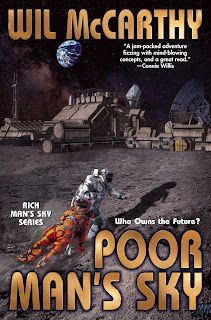Murder, Monks, and the Moon! What's not to like?
Rich Man’s Sky was something of a near-future spy novel set on a space station run by a megalomaniacal billionaire with plans under suspicion of Earth governments. Poor Man’s Sky is a sequel, but not one particularly tied to the original; you’ll recognize some character names and the political situation, as well as the significant fleshing-out of a setting that appeared in bits in pieces in the first book, a setting that complicates the first book’s conflict of government versus business. I would, however, recommend that you read the first book anyway, partially because it is very good and partially because I sense that McCarthy is planning great things here.
Much of the book has a particularly intriguing setting: a Catholic monastery on the Moon. Earth’s nearest natural satellite is a perfect place for a monastery, and McCarthy exploits this congruence. Outer space is a place where the work is monotonous and exacting, far from other people - and so is a monastery! There’s a certain claustrophobia here that creates a very particular sense of mystery here. It’s also quite historically apt, as the Catholic Church has on several occasions adapted to modernity in surprising ways.
If Rich Man’s Sky is a spy novel in space, Poor Man’s Sky is a detective story in space. This leads to some mildly convoluted exposition, especially regarding the main character, who is a police detective in Colorado Springs. In many ways, he is a clear homage to detective fiction of yore, but McCarthy has imbued him with great dialogue and much pathos. He is a man of the world in an environment - the monastery - where being ‘worldly’ is a sin, and the culture clash, on both ends, is some of the best parts of the book (I liked the bit about whether monks can drink a certain beverage).
The plot is complicated, but never becomes convoluted. The inciting incident is a very peculiar coincidence regarding a landing and a death under suspicious circumstances. Through all this, what strikes me so much is how well McCarthy uses isolation. The Moon is a harsh mistress in McCarthy’s universe, and there is a claustrophobia that pervades much of the narrative, on the Moon and in other settings, that forces a certain focus and a certain edge. In investigating a death, the characters are courting death, and it makes for compelling reading.
What surprises me is that, despite McCarthy being a libertarian, is how blistering a critique of the corporatization of space this series is. One subsidiary setting in the novel is a space station run by a Russian oligarch in the throes of an outright worker revolt, and the workers are portrayed quite sympathetically. Here, the isolation is even starker as the trip back to Earth is one more thing the bosses can deny their employees. As elsewhere, the isolation focuses the plot sharply. The menace of the bosses is colder than it would be on Earth, to great effect.
Rich Man’s Sky was a confident first step. Here, McCarthy’s series hits its stride, combining a number of seemingly disparate elements to form a biting critique of current trends in the development of human activity in outer space. Read the first book first, of course, but hasten to read this one. It’s worth it.
--
The Math
Nerd Coefficient 8/10
- Great use of isolation
- workers uprisings in space
- great narration
POSTED BY: Alex Wallace, alternate history buff who reads more than is healthy
